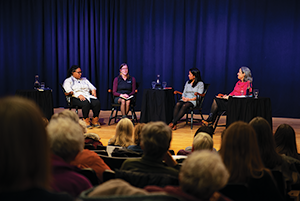Women in climate activism explore intersectional approach to climate justice
January 27, 2023
 Cora Dow
Cora DowThe Environmental Studies department partnered with the Nature Conservancy to host a panel entitled “Women in Climate: Community” yesterday in Kresge Auditorium. State Director of the Nature Conservancy in Maine Kate Dempsey ’88 led the discussion alongside three female panelists involved in fighting climate change. The panelists focused on the intersectionalities between climate justice and other social justice issues and steps for creating holistic forms of climate action.
Author and climate activist Teona Williams ’12 kicked off the discussion by emphasizing how Black and Indigenous women are disproportionately impacted by climate change. Williams connected her experience living in a community of color in Jackson, Miss. to her personal philosophy on the importance of considering climate and social justice issues together.
“The climate crisis is the poverty crisis is the water crisis … and if we’re not in a position where we’re willing to address all of those as [being] mutually entangled, then there is no climate action that’s actually going to be successful,” Williams said.
Williams highlighted the historic role of Black feminists on the front lines of climate activism.
“There’s not one Black feminist that I study who hasn’t been thinking deeply about these entanglements,” Williams said. “If we shift our perspective to helping those who, at the time, were the most marginalized, then we’re automatically helping everyone, and we are actually protecting our climate.”
Van Du ’08, a climate and hazard mitigation planner, echoed this focus on whose voice is heard in these discussions, emphasizing the importance of involving local communities in creating climate projects. In her work, she has witnessed firsthand how projects can collapse when critical communities are not consulted.
“We need to ask who has the voice in making that decision, and how we can make the table a little bigger and invite those in the communities who will be most impacted—communities of color, the vulnerable populations. How can they help be part of that decision making?” Du said.
Williams highlighted the importance of conversation and engagement between those affected by direct impacts of climate change and those working to combat it and spoke of her experiences in Mississippi.
“The opportunity that comes from [listening to] these frontline communities impacted by climate change is that they’re often on the forefront of thinking about climate resiliency and action in more holistic ways,” Williams said.
Dempsey called the audience to action, wrapping up the panel discussion on a reflective and optimistic note.
“When we think about the environmental challenges that we’re dealing with today, they are so complex, so urgent, [and] we can’t keep doing the same things and expecting different results,” Dempsey said. “We need a truly meaningfully engaged community … and that starts with listening and not just hearing.”
Students walked away from the talk with admiration of the panelists and hope about the future of climate justice. Lierin Peterson ’26 gained more insight about future career opportunities from the panel.
“It’s great to see four women who have taken different paths who are doing cool things,” Peterson said. “It was so interesting to hear the wide variety of activities that the panelists are doing, from climate planning to teaching.”

Comments
Before submitting a comment, please review our comment policy. Some key points from the policy: